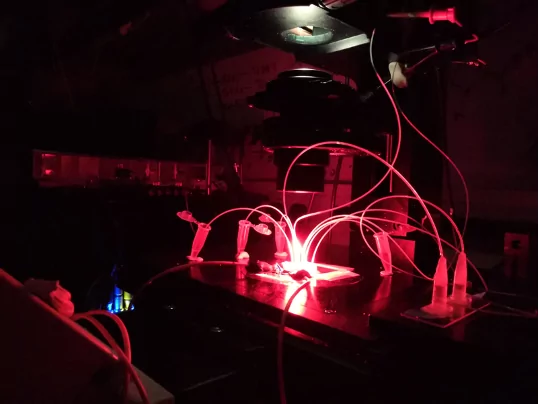Evoralis, which specialises in the discovery and development of enzymes for the depolymerisation of plastics, reports that it has raised £2.5 million in a seed round of funding, which represents a significant milestone in Evoralis’ mission to innovate the recycling scenario for textiles and other plastics.
The round was led by LIFTT with co-investment from Cambridge Enterprise Ventures, Parkwalk Advisors and Backbone Ventures, as well as circular economy-focused investors Circular Plastics Accelerator and Archipelago Ventures, plus angel investors. CPI also successfully converted the convertible loan into shares and acquired shares in the company.
Evoralis, a spin-out from the Hollfelder Laboratory of the University of Cambridge, exploits a high-throughput, microfluidics-based screening platform to discover and refine enzymes capable of breaking down complex plastics into their basic components. This platform, capable of speeding up enzyme screening by up to a thousand times compared to traditional methods, represents a new frontier for the creation of an economically sustainable circular economy in the textiles and plastics sector.
The textile industry is going through a crucial moment: global fibre production has almost doubled in the last 20 years, reaching a value of 109 million tonnes in 2023, much of which is not, and cannot be, recycled. The challenge of recovering mixed and blended fibres is immediate and urgent; in Europe alone, around 6 million tonnes of post-consumer textile waste is generated each year, and 60 per cent of the garments sold today contain fossil-derived plastics that cannot be easily recovered by existing recycling methods, the company says in a note.
Evoralis is addressing this challenge with its revolutionary enzyme technology, which will offer a concrete solution to recycle more than 80% of textiles, including mixed and composite fibres containing plastics. Evoralis’ revolutionary approach will enable the separation of different materials within textiles and has the potential to generate a $560 billion market.
The company’s platform has already attracted the attention of major fashion retailers, who have commissioned Evoralis to develop specific enzymes for recycling nylon and polyurethane, two of the most difficult synthetic polymers to recycle.
Daniel Kaute, CEO of Evoralisdid say in a note: “We are thrilled to have the support of LIFTT and our investors as we take this fundamental step forward in the transformation of textile recycling. This funding will enable us to further develop our enzyme technology, making it possible to recycle textiles and plastics previously considered non-recyclable. Our vision is to create a world where waste is a resource, and this investment brings us one step closer to realising that vision”.
Edoardo Bianchi, project manager at LIFTT says: “Leading this investment round reflects our confidence in Evoralis’ cutting-edge technology and its potential to revolutionise textile recycling. LIFTT has always been committed to supporting innovative solutions that address critical environmental challenges and Evoralis’ approach to enzymatic recycling represents a breakthrough for the circular economy.”
Philippe Bernet, partner at Backbone Ventures, adds: “Although we usually focus on the DACH region, we made an exception for this UK company due to the exceptional strength and track record of the team, which was highly recommended to us by our trusted venture partner Jürgen Eck, who will join the board as an independent director and Chairman of Evoralis. The revolutionary technology developed within the University of Cambridge, together with the commercial interest they have already generated, has really impressed us.”
Claire Shrewsbury, director of insights and innovations del WRAPsays: ‘The use of enzymes in chemical recycling marks a significant moment in the history of tissue-to-woven recycling. It will transform opportunities for hard-to-recycle fractions, such as mixed fibre blends. Garments and textiles have a huge environmental impact and it is imperative to recover these valuable resources. In the UK alone, around 1,453,000 tonnes of post-consumer textiles were produced in 2022. More than half (759,000 tonnes) were sent to landfill or incineration at the end of their lifecycle, thus lost forever. We cannot emphasise enough the importance of investing in new technologies to recover and recycle this valuable material into recycled content to replace the use of virgin materials in the textile industry’.
Fatima Kranc, investment manager at Cambridge Enterprise Ventures, says: “We are delighted to participate in the seed round of Evoralis. This investment is in line with our ongoing commitment to support Cambridge University’s founders in bringing innovative solutions to market. Evoralis’ project on enzymes for tissue bio-recycling is an exciting tool and the addition of Evoralis to our sustainability portfolio is an important step forward.” As Investment Director of the Board of Directors, I look forward to the journey ahead with the Evoralis team.”
ALL RIGHTS RESERVED ©
